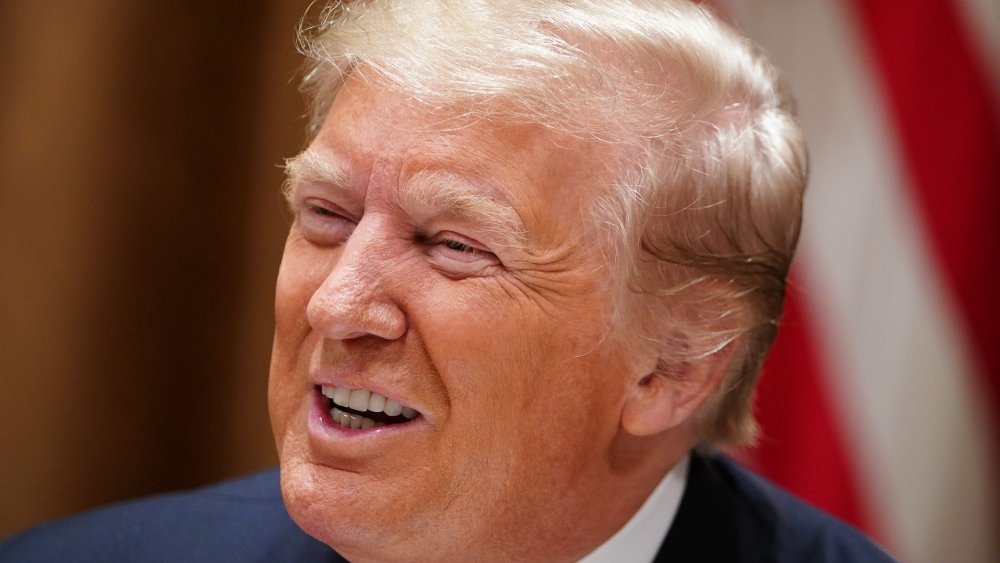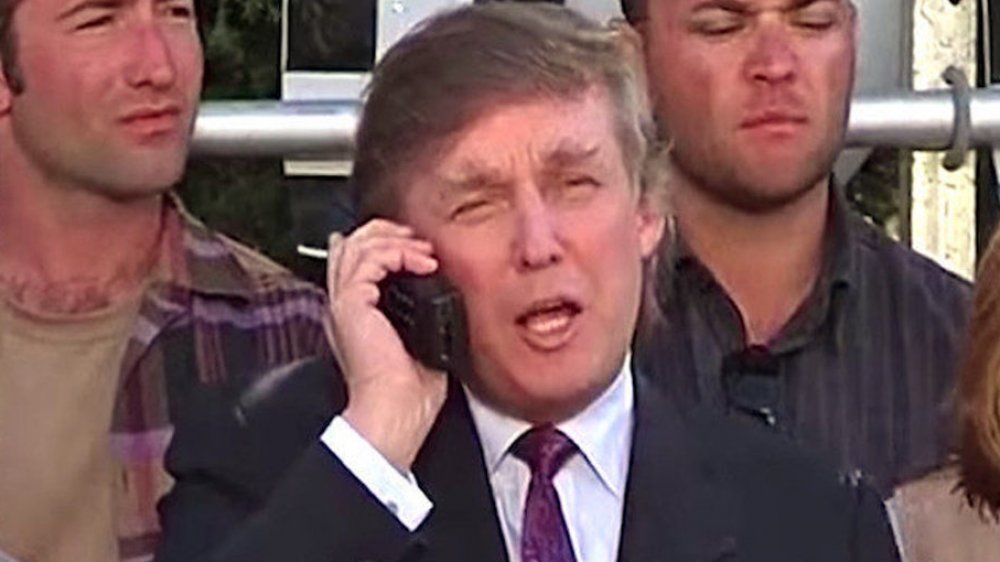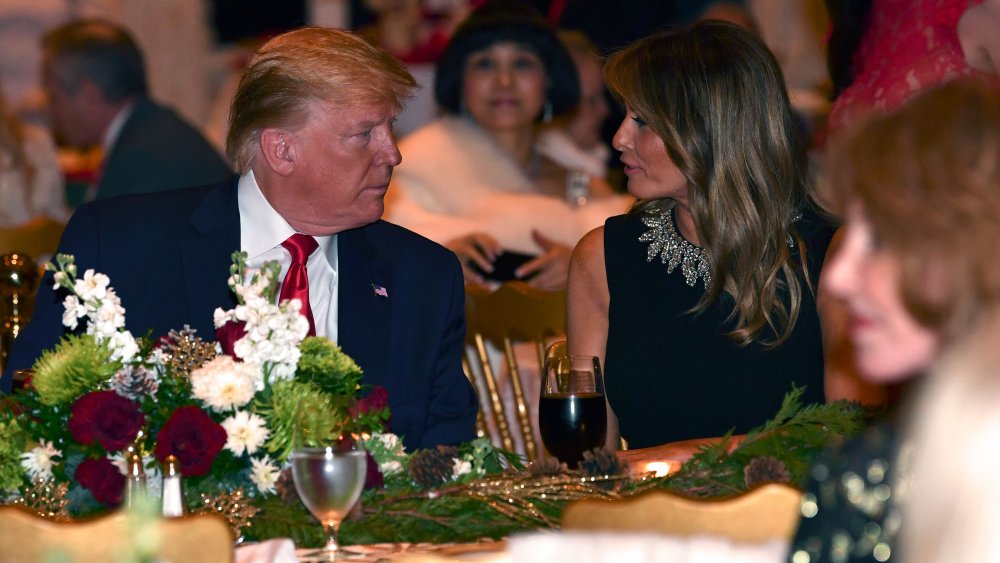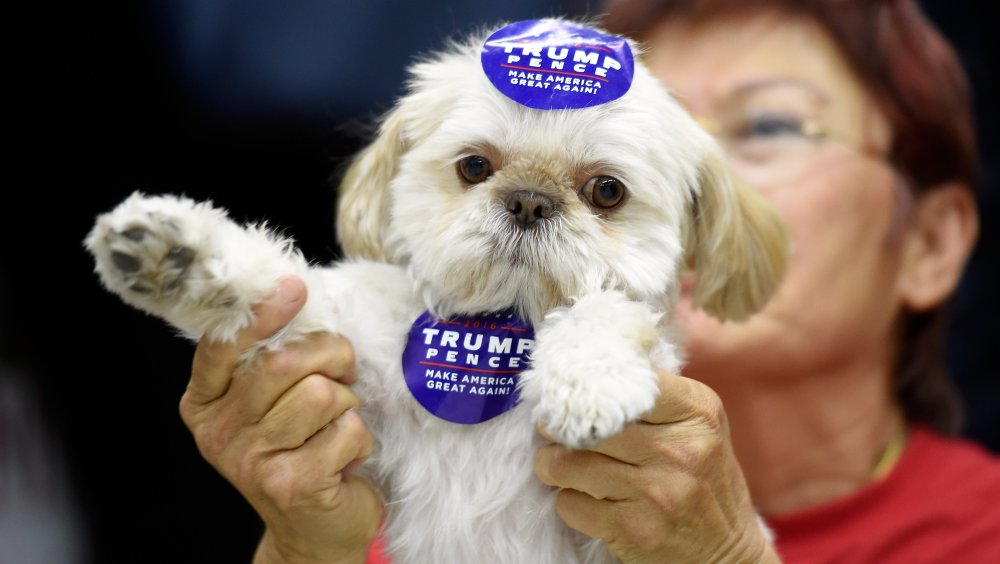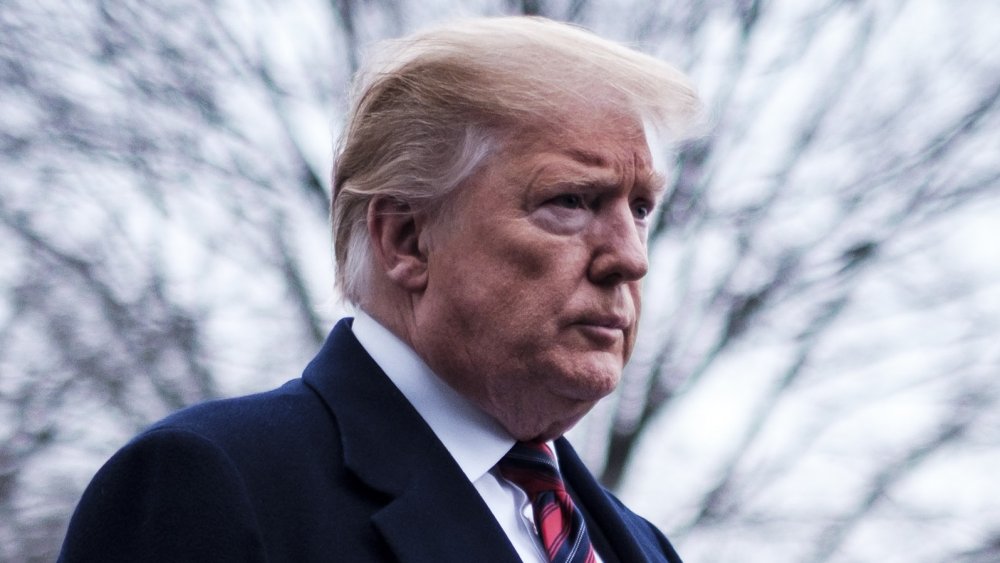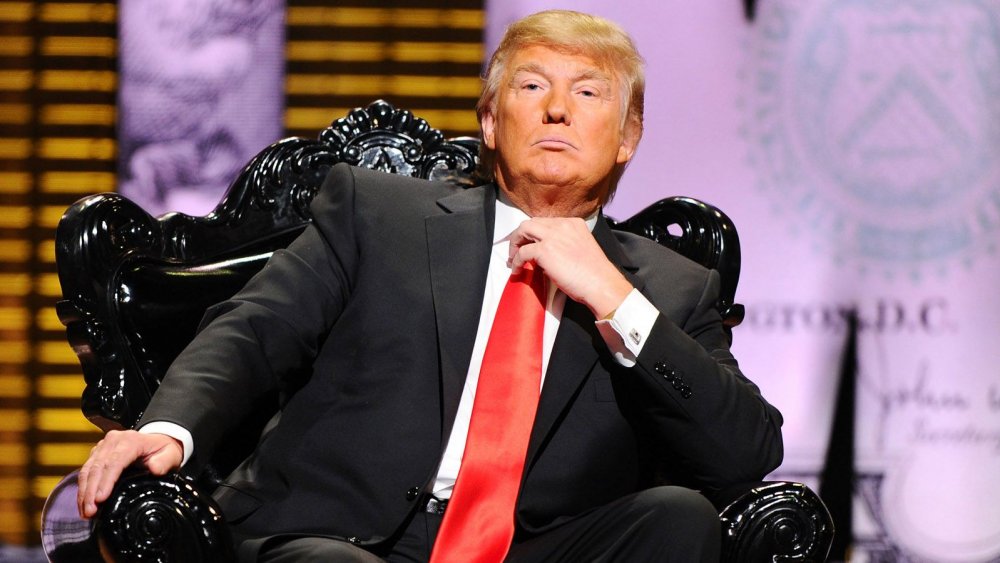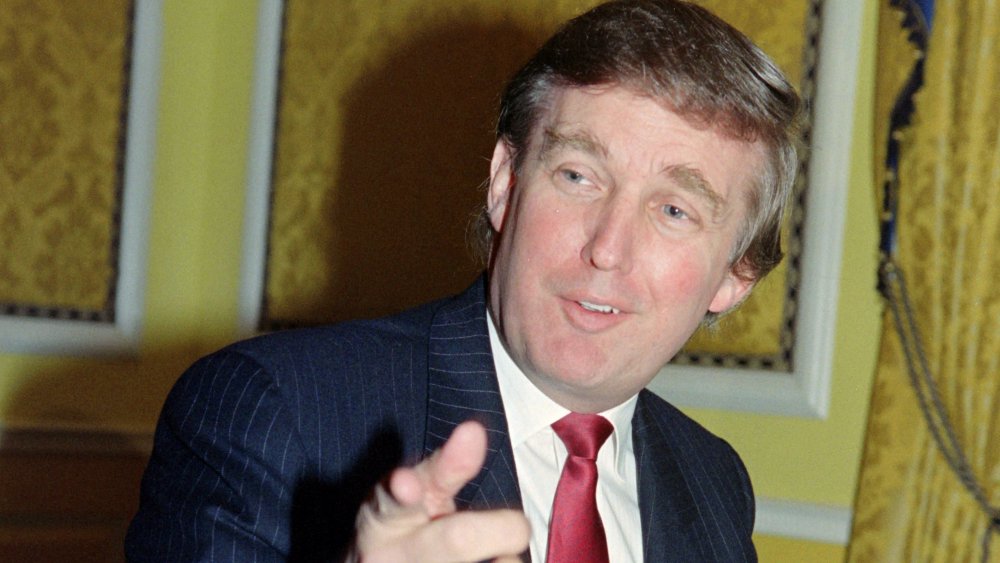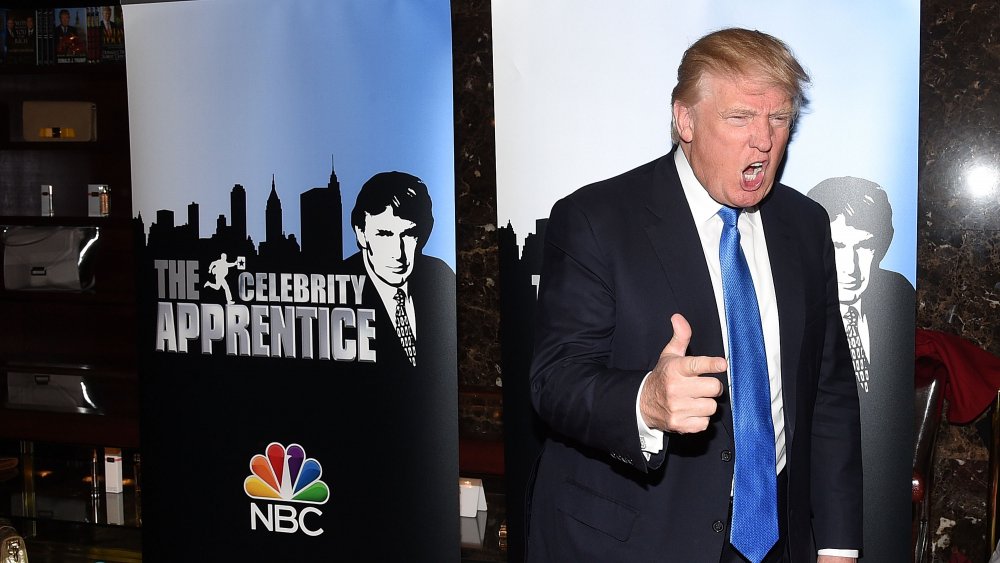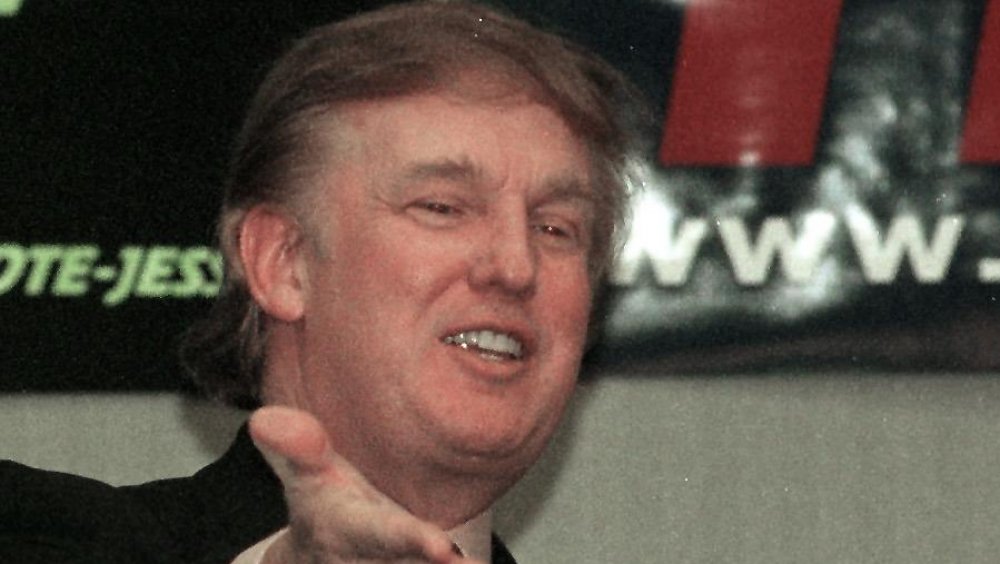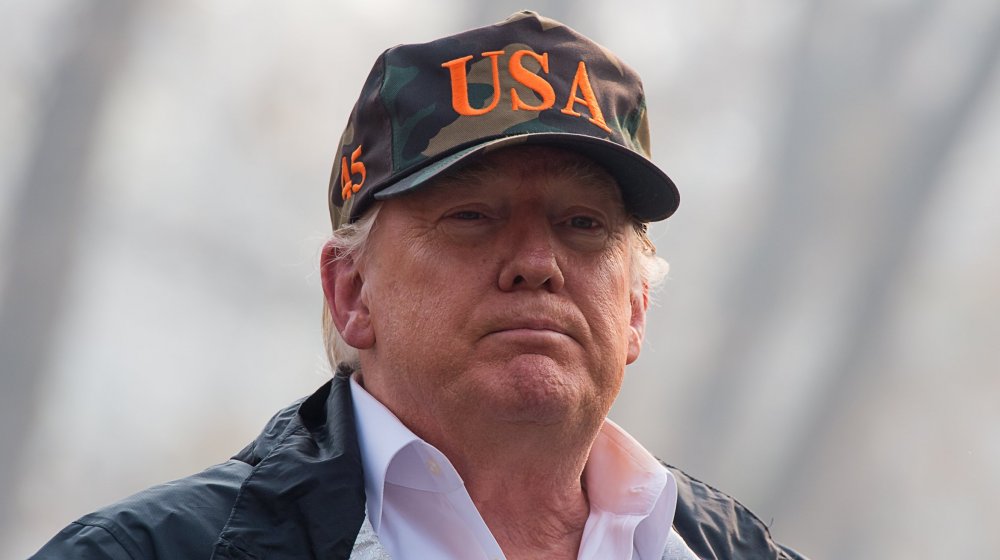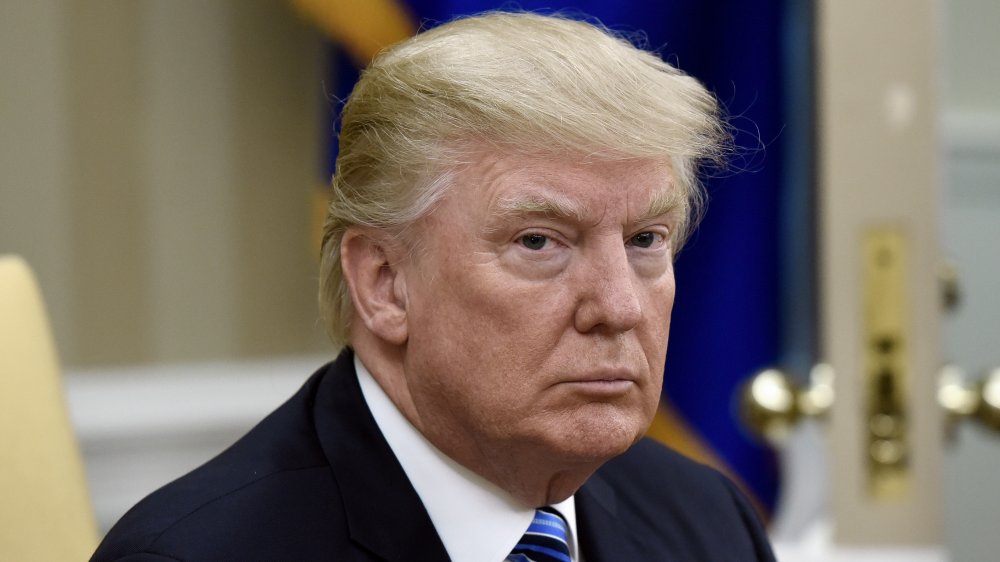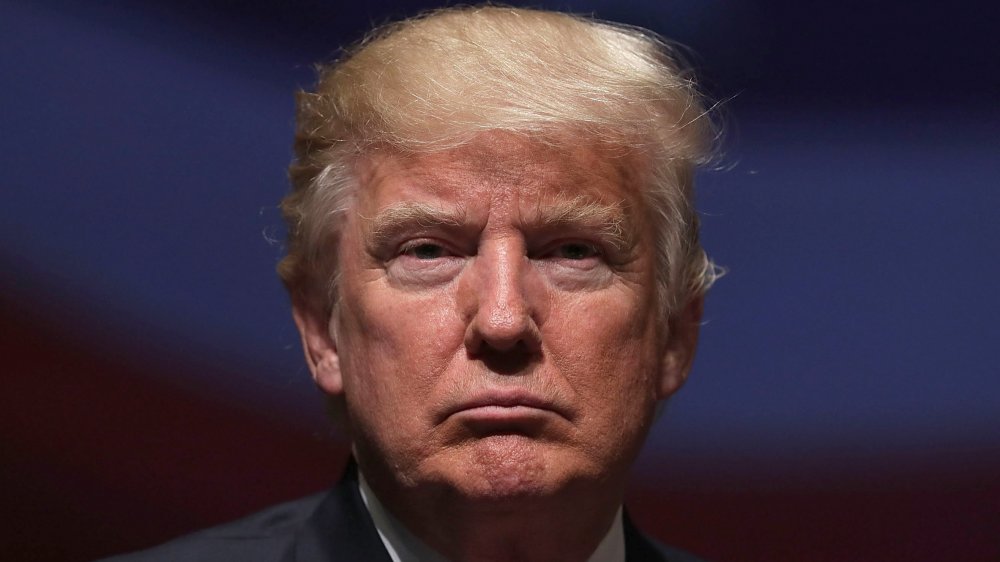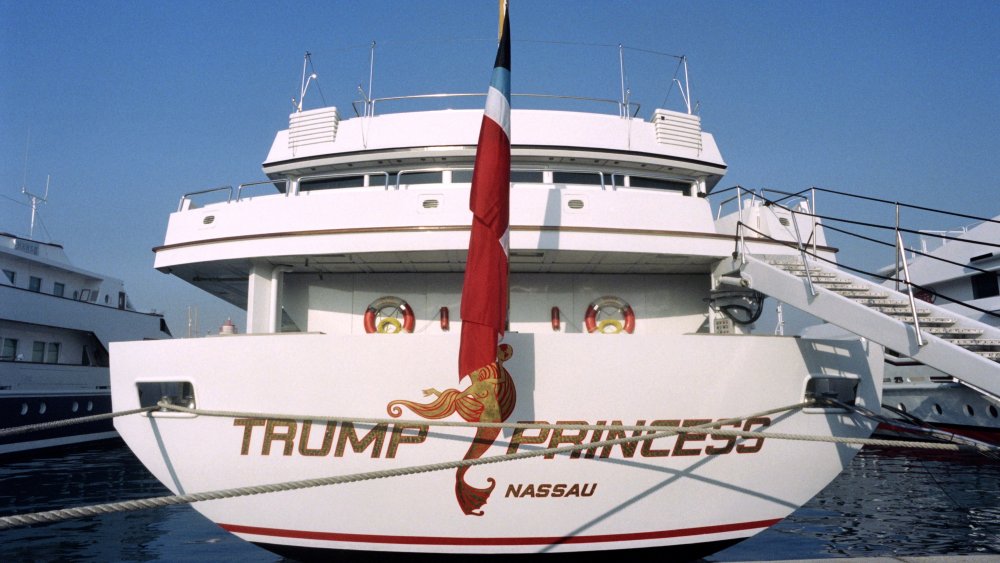The Untold Truth Of Donald Trump
Donald Trump is undoubtedly one of the most polarizing figures in recent American political memory ... and maybe of all time. Since his inauguration as President of the United States in January 2017, he and his administration have upended the way Washington, D.C. conducts business. That's earned him fervent "Make America Great Again" hat-sporting supporters and dedicated opponents (a.k.a. "the Resistance") in equal measure.
But no matter how you feel about The Apprentice alum, it's undeniable that the man has lived a grand and colorful life with many disparate chapters: He's been a real estate mogul specializing in high-rises and casinos, hosted Saturday Night Live twice, participated in multiple professional wrestling events, has been married three times, released his own vodka line, and more.
It's certainly not the same trajectory that propelled anyone else to the White House. Sit back and relax as we take a look at the wild and improbable life of Donald Trump.
Starring Donald Trump as Donald Trump
Apart from Ronald Reagan, Donald Trump is one of the first celebrity-turned-presidents, in that before he took residence in the White House, he was famous for being a man-about-town in New York City — from where he based his real estate tycoon operations. Trump also appeared in about a dozen movies. Nearly every one of them marked a cameo appearance as "Himself," popping up in Manhattan-based films like Home Alone 2: Lost in New York, Two Weeks Notice, Wall Street: Money Never Sleeps, Zoolander, The Associate, and Eddie. (A notable exception: Trump portrayed "Waldo's Dad" in 1994's The Little Rascals.)
While other stars like Paris Hilton would later appear in movies as a way to boost the film's potential popularity, Trump wasn't cast from a marketing standpoint. According to Matt Damon, a lot of those parts came at the property-owning future president's behest. "The deal was that if you wanted to shoot in one of his buildings, you had to write him a part," Damon told The Hollywood Reporter, relaying information he'd learned from Scent of a Woman director Martin Brest. "Donald Trump walks in and Al Pacino's like, 'Hello, Mr. Trump!' — you had to call him by name — and then he exits. You waste a little time so that you can get the permit, and then you can cut the scene out." Or, as Trump's filmography proved, sometimes keep it in.
Cleanliness is next to Trumpiness
Fast food is Donald Trump's cuisine of choice when entertaining championship-winning sports teams at the White House. He loves the stuff! According to aides Corey Lewandowski and David Bossie in Let Trump Be Trump (via the Independent), the president's standing McDonald's order consists of two Big Macs, two Fillet-o-Fish sandwiches, and a shake. Why does Trump love Mickey D's so much? Fear. "He had a longtime fear of being poisoned, one reason why he liked to eat at McDonald's — nobody knew he was coming and the food was safely premade," Michael Wolff wrote in Fire and Fury: Inside the Trump White House (via Newsweek).
This all plays into how Trump is, as he told CNN's Anderson Cooper in 2016, apparently "a very clean person." In an interview on The Howard Stern Show (via Newsweek), Trump told the shock jock that he washes his hands as much "as possible" each day. A crew member from The Apprentice also told Slate that Trump is reportedly "not good with people touching him, he's very germophobic," adding, "We were instructed never to touch him — he wouldn't shake hands." GOP primary rival Jeb Bush used that last item as an attack. "Would you rather support a candidate who strives to shake every hand everywhere," read a post on Bush's campaign site (via the New York Post), as opposed to one "who is a germophobe when it comes to shaking hands?"
No dogs allowed in the Donald Trump White House
If all the U.S. presidents were featured in a high school yearbook, Donald Trump would receive a number of "superlatives." Taking office at 70 makes him the oldest president ever, but he's also the wealthiest president, and the first to inhabit the Oval Office despite no prior political or military experience. Trump will also go down in the presidential trivia history books for the odd fact that he's the first POTUS in more than 200 years to not have pets in the White House. Nearly all of Trump's predecessors brought an animal to Washington — Thomas Jefferson had some bear cubs, John Quincy Adams reportedly kept an alligator, William Howard Taft loved his cow, Bill Clinton had a cat named Socks, and Barack Obama adopted Portuguese water dogs named Sunny and Bo. But there are no capitol critters in the Trump White House.
The reason: Trump isn't much into pets. "Donald was not a dog fan," the president's first wife, Ivana Trump, wrote in her memoir, Raising Trump. She had a beloved poodle named Chappy, and when she moved to New York to be closer to her husband, she, of course, wanted to bring along the dog. He apparently refused ... that is, until Ivana told him that she and Chappy were a package deal.
Drinks are not on Donald Trump
Donald Trump is not without vice, and he'd likely admit to as much. His love of fat/calorie/comfort-laden fast food is well documented, and he reportedly watches as much TV as he can fit into his busy schedule. But there's one big indulgence in which the president apparently doesn't abide — and that's alcohol.
While in his twenties, Trump's older brother, airline pilot Freddy Trump, developed a severe lifelong drinking problem. Complications from the disease directly led to the elder Trump's death in 1981 at the age of 43. "I watched him, and I learned from him," Donald Trump told The New York Times of seeing his brother make bad choices that worsened his condition. As a result of his brother's example, President Trump has claimed that he's never touched a drop of booze in his life. While declaring a national health emergency over the ongoing opioid crisis in 2017, Trump recalled Freddy, calling his brother a "great guy" with the "best personality" (via Politico). However, he also made note of Freddy's addiction issues, saying, "And to this day I've never had a drink, and I have no longing for it. I have no interest in it."
Boom, roasted
In 2011, Donald Trump joined the ranks of Charlie Sheen and David Hasselhoff when he became the subject of a Comedy Central Roast. At the time, Trump was a big reality TV star known for his stint as the host of NBC's The Apprentice, which aired to high ratings and critical acclaim. But after Trump went into politics and secured the Republican nomination for president in 2016, the behind-the-Roast stories started to emerge.
According to HuffPost, Trump was scripted to come out on stage at the beginning of the show in a golden golf cart, surrounded by several model-type women, then hand his coat to one of them. During the dress rehearsal, Trump reportedly asked stage manager Robert Ferkle for a different coat-handler, because the first woman "was not pretty enough."
To ensure that the ribbing comes somewhat from a good place, a roast dais is generally populated with friends of the subject. Sadly, producers had a hard time getting any of Trump's famous friends to commit. WWE boss Vince McMahon, Regis Philbin, Mike Tyson, and Tom Brady all said no. Trump knew what he was getting into when he agreed to be roasted, and was game for all kinds of savage mockery. Still, as a courtesy, producers ask the subject if any topics are out of bounds. Trump had two: roasters couldn't suggest that he isn't as wealthy as he's publicly claimed or make fun of his history of bankruptcies.
Barron of industry
One of the longest-serving members of the Trump Organization, apart from Donald Trump's adult children, is a spokesman named John Barron. When a member of the media needed to speak with Trump in the '80s, they'd more often than not get Barron on the phone instead, per The Washington Post. Barron was a master spin doctor, always ready with a clever and straightforward quote when Trump faced criticism for controversial actions and decisions. For example, reporters from major news media outlets quoted Barron after a plan to build Trump Castle crumbled, and during Trump's failed USFL business deals.
Trump relied on Barron from 1980 to 1990, when the spokesman stopped responding to reporters. Was he fired? No — he never actually existed. In 1990, Trump had to testify in a lawsuit, and the subject of John Barron came up. "I believe on occasion I used that name," Trump said while under oath. In other words, Trump admittedly acted as his own spokesman while using a fake name.
Donald Trump ain't no hollaback girl
What prompts an individual to run for president? If they're already a politician, then a promotion to the White House can advance their political agenda. Donald Trump is a different case, however, because he wasn't a politician at the dawn of his 2016 presidential campaign — he'd never held elected office before. In the mid-2010s, Trump was a celebrity real estate tycoon and the host of the immensely popular NBC reality game show The Apprentice. (In addition to watching nervous guys in suits run around Manhattan trying to perform tasks, it gave the world Trump's catchy catchphrase, "You're fired!")
Also on the NBC schedule at the time: singing competition The Voice, anchored by celebrity vocal coaches like singer Gwen Stefani. Around 2015, Stefani was earning an estimated $384,000 per episode, according to USA Today, which was reportedly a far bigger weekly wage than the network paid Trump for The Apprentice. Per an interview with documentary filmmaker Michael Moore in The Hollywood Reporter, that allegedly incensed Trump. So, in 2015, he announced his candidacy for president at Trump Tower to supposedly get attention, which, he in turn, hoped would get NBC attention, and thus leverage them into paying him more for The Apprentice. "He'd been talking about running for president since 1998, but he didn't really want to be president. There's no penthouse in the White House," Moore claimed. "He was trying to pit NBC against another network."
Trump/Winfrey 2000?
While Michael Moore's "Gwen Stefani theory" was largely speculation, he was absolutely correct in pointing out that the 2016 election was not the first time that Donald Trump considered a run for the White House. According to The Hill, Trump changed his political party affiliation from the Republican Party to the Reform Party in 1999. He had to do that if he wanted to be that party's presidential candidate. Led by frequent third-party candidate Ross Perot, the Libertarian-leaning organization grew in influence in the '90s and looked to be viable in the 2000 presidential election.
Trump apparently thought he could win the White House for the Reform Party, and formed a campaign exploratory committee, before making the talk show rounds. He even won the California Reform Party primary, and then started to talk publicly about running mates. (His short list apparently included Oprah Winfrey, Warren Beatty, and Cybil Shepherd.)
Ultimately, Trump dropped out soon after his California win, because he thought the Reform Party was crumbling from the inside and couldn't give him the "support a candidate needs to win."
Donald Trump was a baseball boy
Many recent American presidents seem to be closely associated with a sport: Barack Obama is an avid basketball player, George W. Bush was an owner of the Texas Rangers, and Donald Trump apparently came very close to playing professional baseball.
On a 2010 episode of the MTV series When I Was 17, in which famous people fondly recalled their teen years, Trump revealed his athletic side. "I was captain of the baseball team," Trump claimed. "I was supposed to be a professional baseball player." A teacher at Trump's alma mater, the New York Military Institute, even told Rolling Stone (via Inquirer) that the Philadelphia Phillies had scouted him. "He was good-hit and good-field," Col. Ted Dobias claimed. "We had scouts from the Phillies to watch him, but he wanted to go to college and make real money." Dobias told the Daily Mail that scouts from West Point also sought out, to no avail, Trump's services at first base.
A league of Donald Trump's own
While Donald Trump gave up on his dreams of playing baseball, he couldn't get America's pastime out of his head. According to Deadspin, Trump expressed interest in buying several Major League Baseball teams in the 1980s, including the Cleveland Indians, Minnesota Twins, Seattle Mariners, San Francisco Giants, Pittsburgh Pirates, and San Diego Padres.
After negotiations fell apart each and every time, Trump took another tack: In 1989, he announced the creation of the Independent Baseball League. Trump and associates announced that Washington, D.C. would get a team, as would the New York area (which Trump would own and run himself). Other cities discussed to receive franchises included Los Angeles, Denver, Phoenix, Indianapolis, Sacramento, Portland, New Orleans, and more.
What likely killed the IBL (or just "The Baseball League," as it was sometimes called)? Trump wanted play to begin in 1990, less than a year after formation. Not helping things was a recruiting debacle involving Ben McDonald, a pitcher selected by the Baltimore Orioles with the #1 pick in the 1989 MLB Draft. After the Orioles offered a modest contract, Trump counter-offered McDonald a robust $2.25 million to play in the IBL for three years ... which McDonald apparently used as leverage to get a better deal in Baltimore. After he was unable to secure McDonald, the development of the IBL apparently fell apart, and Trump stopped talking about it publicly.
Check on it
In 1986, reporters Graydon Carter (he'd later head up Vanity Fair) and Kurt Andersen founded Spy, a satirical comedy magazine that spoke truth to power in government and commerce through savage mockery. As the magazine was based in New York City, Spy focused on the colorful figures of that city — making Donald Trump, a local real estate baron with a flair for self-promotion and tendency to put his name on the buildings he developed, a frequent and obvious target. (Spy didn't just comment on his business dealings — they also mocked his appearance, frequently calling Trump a "short-fingered vulgarian.")
According to a 2016 NPR interview with Carter and Andersen, Trump reportedly threatened to sue on more than one occasion, and Spy would then dutifully publish Trump's angry letters. On another occasion, the magazine delivered checks to big-time New Yorkers, planning to make fun of whoever cashed them ... because the checks were ridiculously small. Supposedly, Trump deposited the checks. "He cashed the 64-cent and the 32-cent check," Carter claimed. "Then we sent out 16-cent checks to people, the people who'd signed the 32-cent check. And only two people cashed the 16-cent check, [Saudi Arabian businessman] Annan Khashoggi and Donald Trump."
Donald Trump likes to travel in style
Sure, Donald Trump is rich, but how much money, exactly, does he have? The short answer: A lot. The long answer: It's complicated. As he's not made his tax records — and thus an accurate reporting of his income — public, all the media can do is estimate. In 2019, Forbes calculated Trump's net worth to be in the area of $3.1 billion. (Of that, $1.5 billion comes from pricey New York City real estate holdings, and $590 million from golf properties.) That's obviously a lot of money, but a figure that differs significantly from the $10 billion Trump said he had in the bank back in 2016.
Whether Trump has got $3 billion or $10 billion at his disposal, it's enough to keep funding the lavish lifestyle to which he's become accustomed. In 1989, "The Donald" dropped about $30 million on a 282-foot yacht he re-christened the Trump Princess. Ironically, the future president didn't even like boats. "I'm not into them," he told Boat International. "I've been on friends' boats before and couldn't get off fast enough." And years before he won the right to fly on the real Air Force One, Trump purchased a luxurious private jet he called "Trump Force One." According to The New York Times, it featured 43 seats, all of them outfitted with 24-karat gold, along with a dining room, multiple bedrooms, and several huge TVs. Talk about always traveling in style.

